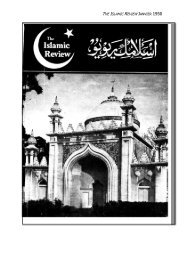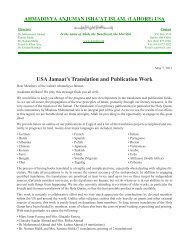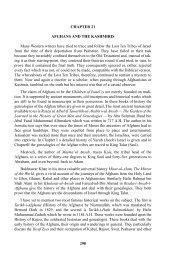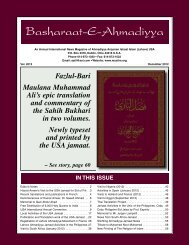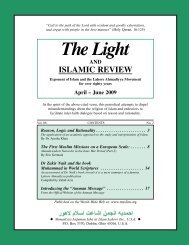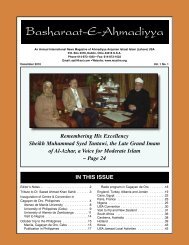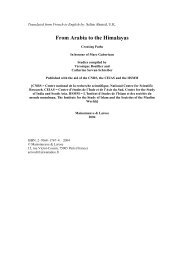Part 2] HARD TRIALS NECESSARY TO ESTABLISH TRUTH 69 152 ...
Part 2] HARD TRIALS NECESSARY TO ESTABLISH TRUTH 69 152 ...
Part 2] HARD TRIALS NECESSARY TO ESTABLISH TRUTH 69 152 ...
Create successful ePaper yourself
Turn your PDF publications into a flip-book with our unique Google optimized e-Paper software.
84 Ch. 2: THE COW [Al-Baqarah<br />
swallow up a part of the property of<br />
men wrongfully while you know. a<br />
SECTION 24: Fighting in Defence<br />
189 They ask thee of the new<br />
moons. Say: They are times appointed<br />
for men, and (for) the pilgrimage. a<br />
And it is not righteousness that you<br />
enter the houses by their backs, b but<br />
he is righteous who keeps his duty.<br />
And go into the houses by their doors;<br />
and keep your duty to Allåh, that you<br />
may be successful.<br />
190 And fight in the way of Allåh<br />
against those who fight against you<br />
but be not aggressive. Surely Allåh<br />
loves not the aggressors. a<br />
188a. The injunction to abstain from illegally taking other men’s property is a fitting<br />
sequel to the injunction relating to fasting, for by fasting a man abstains from using what<br />
he has a legal right to, simply in obedience to Divine commandments. Fasting, in fact,<br />
enables a man to control his passions, and the more the passions are mastered, the less<br />
the greed for illegal acquisition.<br />
189a. The month of Rama˙ån begins with a new moon and ends with the new moon<br />
of Shawwål. The latter is followed by three months, Dhu-l-Qa‘dah, Dhu-l-Ïijjah (with<br />
which the year closes) and Mu√arram (the first month of the new year). These three<br />
along with Rajab, the seventh month of the year, form the four sacred months, which are<br />
referred to here in the word ahillah, pl. of hilål, meaning the new moon.<br />
The indefiniteness of the question is removed by the answer. These were the months<br />
which were observed by the Arabs as sacred, in which the bitterest hostilities ceased and<br />
peace was established throughout the land, and thus trade was carried on peacefully and<br />
without molestation. It was also during these months that the pilgrimage to the sacred<br />
sanctuary at Makkah was performed. As this section deals with the injunctions relating<br />
to fighting, the question relating to the sacred months, which is made clearer in v. 217, is<br />
appropriately put here, and the answer recognizes the sacred character of those months.<br />
Their sacredness afforded to the people the material advantage of being able to carry on<br />
trade and the spiritual benefit of performing the pilgrimage.<br />
189b. The Arabs were a very superstitious people. When one of them set before<br />
himself an important object and was unable to attain it, he would not go into his house<br />
by the door, but entered it by the back and kept on doing so for a year (Rz). Or, the<br />
reference may be to the practice of entering the houses by the back on entering into a<br />
state of i√råm for pilgrimage (B. 65: ii, 29). With Islåm all superstitions were swept<br />
away. Or, entering by the back indicates turning aside from the right course, while<br />
entering by the doors signifies sticking to the right course (Rz).<br />
190a. This is one of the earliest revelations permitting the Muslims to fight. The


![Part 2] HARD TRIALS NECESSARY TO ESTABLISH TRUTH 69 152 ...](https://img.yumpu.com/11777151/16/500x640/part-2-hard-trials-necessary-to-establish-truth-69-152-.jpg)
